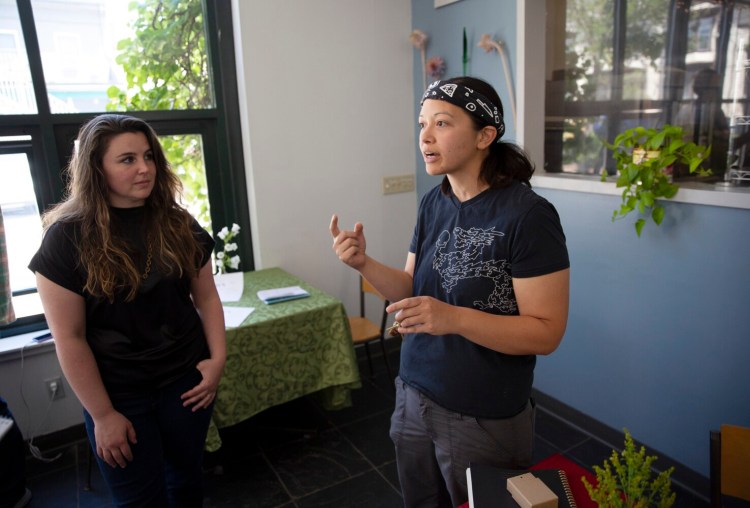A handful of Portland-area restaurants have committed to a national campaign for fair wages, diversity and safe working conditions in the industry as hospitality businesses across the state fight to attract workers in a tight labor market.
RAISE: High Road Restaurants, a national association of business owners, joined Ruby’s West End, Bao Bao Dumpling House, Central Provisions, Chaval, and Portland Hunt and Alpine Club, all in Portland, and Magnus on Water in Biddeford, for a hiring event and media conference Thursday to outline their efforts to improve jobs prone to exploitation, harassment and low pay.
“The age of looking at kitchen work and service work as ‘less than’ is over,” said Corrinna Stum, owner of Ruby’s. “It is good, steady work. You can make a living at it. It is a trade.”
Key to the wage issue for these restaurant is ending the subminimum “tipped” wage. Under Maine law, employers are allowed to pay service workers half the state’s hourly minimum wage as long as tips at least make up the difference. That’s about $6 an hour plus tips.
Instead, the six restaurants committed to paying all their staff at least the state’s full $12.15-per-hour minimum wage plus tips, as well as health care, better work environments and paid sick leave.
The food and beverage industry lost more jobs than almost any other during the pandemic. Convincing those workers to return, attracting new employees and keeping them means changing how the industry has worked in the past, said Mikey Knab, a restaurant owner and national strategy director for High Road Restaurants. The association is working in concert with One Fair Wage, a national movement to end subminimum wages.

Mikey Knab, a restaurateur and advocate from the West Coast, speaks to the media Thursday in Portland. Restaurant owners gathered to speak about higher wages that they are offering in response to a staffing crisis within the industry. Derek Davis/Staff Photographer Buy this Photo
“This is not a worker shortage, this is a wage shortage,” Knab said. “We need to convince people that these jobs are worth coming back to. We believe that means eliminating the subminimum tipped wage.”
In a recent national survey of 2,800 food service workers, more than half said they were considering leaving their jobs. Of those thinking of leaving, 76 percent cited low wages and tips as the reason.
Seven states, including California, Oregon, Washington and Alaska, no longer have a tipped wage and have still seen strong restaurant growth, Knab said.
“Tips don’t go away when you eliminate the subminimum wage,” he said.
The tipped wage in Maine was eliminated in 2016 when voters passed minimum wage increases in a referendum. It was reinstated by the Legislature less than a year later after lobbying by business owners and some workers.
The push to improve wages and working conditions comes as employers across Maine offer wages that are $2 or $3 above minimum wage and dangle sign-on bonuses and fringe benefits to compete in a tight labor market.
Trouble hiring has had huge effects on Bao Bao Dumpling House, the Portland restaurant owned by Cara Stadler. She already offers a full wage with tips, but without workers in the kitchen, she can’t return to a pre-pandemic normal.
Bao Bao is open only five days a week and just for dinner. Tao Yaun, Stadler’s Brunswick restaurant, will only be open two days a week.
“I could double my staff, easy,” she said.
Even the with pay going up at jobs that have historically been low-paying, the effort to improve conditions should still resonate for workers, employers and customers, Knab said.
“If you care whether the chicken on your plate is organic, you should care if your server is paid a living wage,” he said.
Copy the Story LinkSend questions/comments to the editors.




Success. Please wait for the page to reload. If the page does not reload within 5 seconds, please refresh the page.
Enter your email and password to access comments.
Hi, to comment on stories you must . This profile is in addition to your subscription and website login.
Already have a commenting profile? .
Invalid username/password.
Please check your email to confirm and complete your registration.
Only subscribers are eligible to post comments. Please subscribe or login first for digital access. Here’s why.
Use the form below to reset your password. When you've submitted your account email, we will send an email with a reset code.